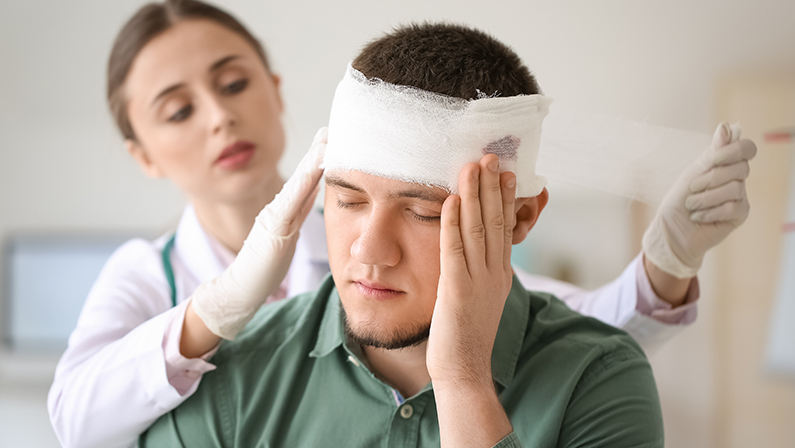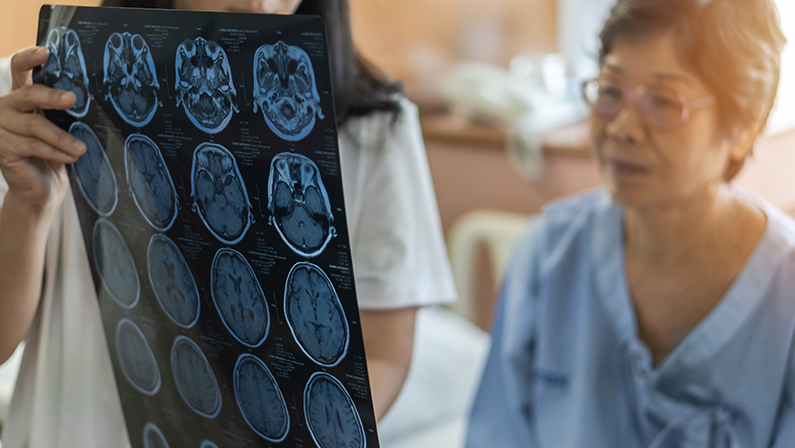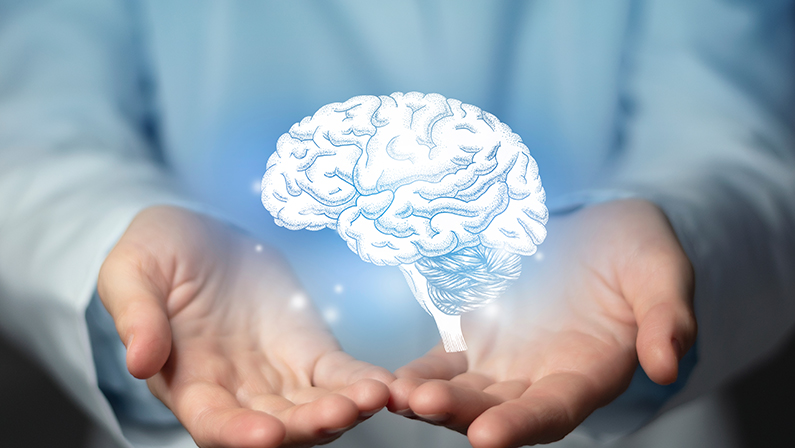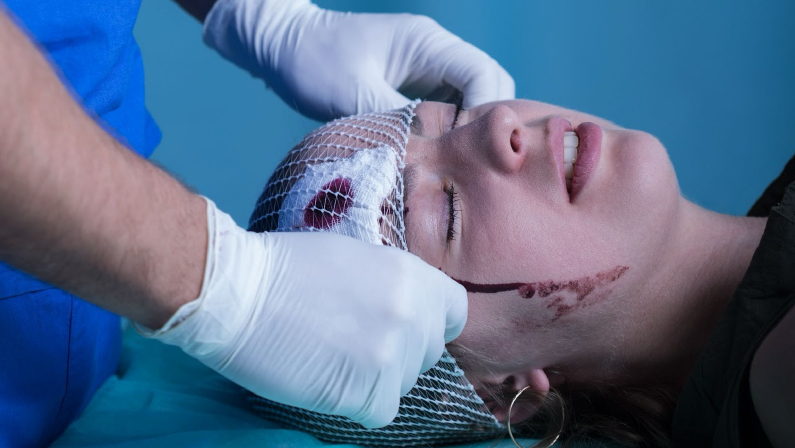The human brain is a remarkable organ, but it’s also incredibly delicate. When a head injury occurs, it can disrupt the intricate workings of the brain, potentially leading to a variety of long-term consequences.
Head injuries are a major concern, so one may ask: “Can dementia be caused by a head injury?” or “Can head trauma cause dementia?” The answer is complex, but research suggests a connection. Let’s delve into the link between head trauma and dementia risk.
The Connection Between Head Injuries and Dementia Risk
Head injuries, also known as traumatic brain injuries (TBIs), can damage brain tissue. This damage can trigger changes that increase the risk of dementia later in life. Studies show that a head injury can cause dementia, particularly repeated or severe TBIs.
How Can Head Injuries Increase Dementia Risk?

While the exact mechanisms aren’t fully understood, several theories explain the potential link between head injuries and dementia:
Abnormal Protein Buildup
A head injury can disrupt the brain’s natural waste disposal system. This can lead to the accumulation of harmful proteins like tau and amyloid beta. These proteins clump together, forming plaques and tangles that damage brain cells and interfere with communication between them. This is a hallmark feature of Alzheimer’s disease, a common form of dementia.
Chronic Inflammation
A head injury can trigger a cascade of inflammatory responses within the brain. This ongoing inflammation damages brain cells and disrupts their function. Chronic inflammation is increasingly recognized as a contributing factor to various neurodegenerative diseases, including dementia.
Blood Vessel Damage
The force of a head injury can damage blood vessels in the brain, disrupting the flow of oxygen and essential nutrients. This lack of vital resources can starve brain cells, leading to cell death and ultimately contributing to dementia risk.
It’s important to note that the severity of the head injury, the number of injuries sustained, and individual factors like age and genetics all play a role in how much head injuries increase dementia risk.
Risk Factors for Dementia Post-Head Injury
While head injuries can increase the risk of dementia, several factors influence the individual’s vulnerability:
Severity of the Injury
The greater the force and damage caused by the head injury, the higher the risk of developing dementia later in life. Severe TBIs, involving loss of consciousness, amnesia, or skull fractures, carry a significantly higher risk compared to mild concussions.
Number of Injuries
Repeated head injuries, even if considered mild concussions, can have a cumulative effect. Each injury can contribute to further brain damage, increasing the overall risk of dementia.
Age
As we age, our brains become naturally more susceptible to neurodegenerative changes. When a head injury occurs on top of this age-related vulnerability, the risk of dementia escalates.
Genetics
Certain genetic factors, like carrying the APOE-e4 gene variant, can increase a person’s vulnerability to dementia after a head injury. This gene variant is also associated with an increased risk of Alzheimer’s disease in general.
Pre-Existing Health Conditions
Individuals with pre-existing conditions like high blood pressure, diabetes, or chronic inflammatory conditions may have a higher risk of dementia following a head injury. These conditions can further compromise brain health and recovery.
Recognizing Symptoms of Dementia Post-Injury

Distinguishing between post-injury cognitive decline and the onset of dementia can be challenging. However, there are some early signs to be aware of that may indicate a more serious issue:
Worsening Memory Problems
This is a hallmark symptom of dementia, especially when it affects recent events more than long-ago memories. Look for a noticeable decline in the ability to remember new information, follow conversations, or recall details from recent activities.
Difficulty Concentrating and Focusing
People with dementia often struggle to maintain focus and attention. They may easily get lost in thought, become easily distracted, or have difficulty completing tasks that require sustained concentration.
Challenges with Language and Communication
Dementia can affect a person’s ability to express themselves clearly. They may struggle to find the right words, have difficulty following conversations, or experience changes in their speech patterns.
Changes in Behavior and Personality
Dementia can cause personality changes, such as increased irritability, apathy, withdrawal from social activities, or unusual behaviors.
Difficulty with Reasoning and Judgment
People with dementia may exhibit poor decision-making skills, struggle with planning and problem-solving, or show a decline in their ability to handle everyday tasks independently.
It’s important to remember that these symptoms can also be caused by other factors besides dementia. However, if you notice a combination of these signs, especially following a head injury, it’s crucial to consult a healthcare professional or an urgent care facility like Aether Health for a comprehensive evaluation. Early diagnosis and intervention are key to managing dementia effectively.
Preventative Measures to Reduce the Risk of Head Injuries
While head injuries can increase dementia risk, the good news is that we can take proactive steps to minimize the risk of head injuries in the first place. Here are some key preventative measures:
- Wear Helmets Consistently
This applies to activities like cycling, motorcycling, skateboarding, rollerblading, and certain sports like baseball or softball. Choose a helmet that fits properly and meets safety standards.
- Seat Belt Use Every Time
Buckle up every time you get in a vehicle, regardless of the distance or speed. Seat belts are the single most effective way to prevent serious head injuries in car accidents.
- Fall Prevention at Home
Falls are a major cause of head injuries, especially for older adults. Make your home environment fall-proof by installing grab bars in bathrooms, removing tripping hazards (loose rugs, clutter), and improving lighting in hallways and stairwells. Consider using non-slip mats in the bathroom and kitchen.
- Improve Balance and Coordination
Exercises that focus on balance and coordination can help prevent falls and head injuries. Activities like tai chi, yoga, or strength training specifically targeting core muscles can be beneficial.
- Childproofing Your Home
If you have young children, take steps to childproof your home to minimize the risk of falls and head bumps. This includes installing safety gates on stairs, using corner protectors on furniture, and securing cabinets and drawers.
- Educate Yourself and Others
Spreading awareness about head injury prevention is crucial. Talk to your family and friends about the importance of wearing helmets, fall prevention, and being cautious during activities that carry a risk of head injury.
Taking Charge of Your Brain Health

So can dementia be caused by head injury? While head injury may cause dementia, it’s important to remember that dementia has multiple contributing factors. By understanding the risks and taking preventative measures, you can empower yourself to protect your brain health.
However, if you experience a head injury, regardless of severity, seeking immediate medical attention is crucial. Early intervention and a visit to your trusted emergency room can significantly improve outcomes and potentially minimize long-term complications.
If you’re in the Pearland, TX area and have suffered a head injury, Aether Health is here to help. Aether Health is a state-of-the-art emergency room with a team of highly skilled medical professionals dedicated to providing immediate and comprehensive care for head injuries and other emergencies. We are equipped with advanced diagnostic technology and prioritize rapid assessment and treatment.
Don’t wait for symptoms to worsen. Visit Aether Health in Pearland or in any of our other locations immediately after a head injury for a thorough evaluation and peace of mind. Our team is committed to helping you get the care you need, when you need it most. Schedule a visit or walk in today – your brain health is our priority.



